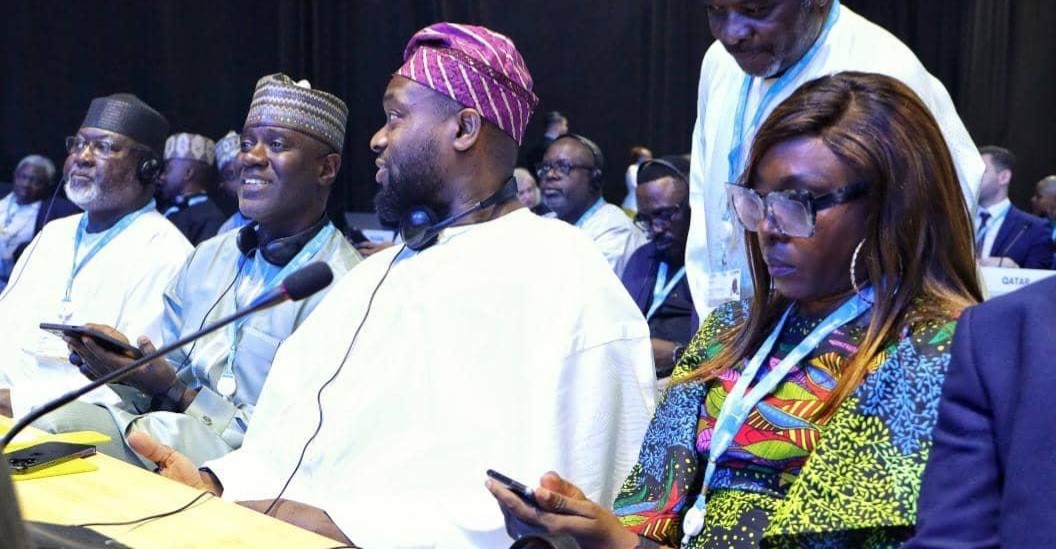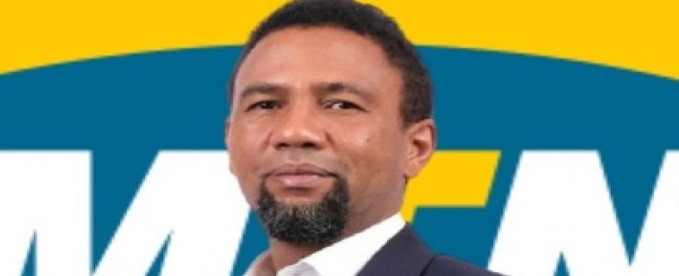Telecom
Nigeria Joins Rest of World to Sign Updated Radio Regulations to Deepen Global Connectivity

At the conclusion of the World Radiocommunications Conference (WRC) 2023, Nigeria joined the rest of the World to sign unto the Final Act WRC-23, which constitutes a record of the decisions taken at the conference.

L-R: Executive Commissioner, Technical Services, Nigerian Communications Commission (NC)), Engr. Ubale Maska; Executive Vice Chairman, Nigerian Communications Commission NCC, Dr. Aminu Maida; Minister of Communications, Innovation and Digital Economy/Head of Nigerian Delegation, Dr. Bosun Tijani, and Managing Director, Nigerian Communications Satellite Limited, Mrs. Jane Egerton-Idehen, during the recently-concluded World Radiocommunications Conference (WRC-2023), where Nigeria joined the rest of the world to sign unto the Final Acts WRC-23, which constitutes a record of the decisions taken at the conference.
The Final Act comprises both the new and revised provisions of the Radio Regulations, an international treaty governing the use of the radio-frequency spectrum and satellite orbits.
Dr. Bosun Tijani, Minister of Communications, Innovation and Digital Economy represented Nigeria and was joined by the Executive Vice Chairman, Nigerian Communications Commission (NCC), Dr. Aminu Maida and the Managing Director, Nigerian Communications Satellite Limited (NigComSat Ltd), Mrs. Jane Egerton-Idehen.
The WRC-2023 is a global, inter-governmental treaty conference which is held every three to four years by the International Telecommunication Union (ITU), the United Nations-affiliated international organization for telecommunications.
At the end of each conference, countries signed unto an updated Final Act, the outcome of agreements on agendas put forward by country administrations.
According to a statement by the ITU, “the agreement to the updated Radio Regulations identifies new spectrum resources to support technological innovation, deepen global connectivity, increase access to and equitable use of space-based radio resources, and enhance safety at sea, in the air, and on land.”
Among the decisions reached, the Conference also identified spectrum for International Mobile Telecommunications (IMT), which will be crucial for expanding broadband connectivity and developing IMT mobile services, also known as 4G, 5G and, in the future, 6G.
The conference also identified new frequencies for non-geostationary fixed-satellite service Earth Stations in Motion (ESIMs) that would provide high-speed broadband onboard aircraft, vessels, trains, and vehicles. These satellite services are also critical following disasters where local communication infrastructure is damaged or destroyed.
Provisions were also included to protect ship and aircraft mobile service stations located in international airspace and waters from other stations within national territories.
Nigeria’s delegation at the conference comprised seasoned engineers and experts in telecommunications and satellite regulations and governance from the Ministry, NCC, National Broadcasting Commission (NBC), NigComSat Ltd, National Space Research and Development Agency (NASRDA), Nigeria Airspace Management Agency (NAMA), telecom operators and other practitioners from the telecommunications industry in Nigeria.
Meanwhile, Tijani, who led the Nigerian delegation at the WRC-23, thanked the delegation for their sacrifices which, he noted, were made for the collective benefit of the future of Nigeria.
He also enjoined the Nigerian delegation to commence preparation for future conferences to ensure the preservation of the country’s interest by developing capacity through investments in extensive research and inter-agency collaboration.
Also, during an engagement with the Nigerian delegation at the conference, Maida commended the delegation for collaborating towards Nigeria’s best interest. He emphasised the conference’s significant importance for Nigeria.
According to him, “the agreements reached at this year’s conference will provide valuable spectrum resources that will benefit the Commission’s stakeholders, especially ordinary Nigerians by enhancing service quality and bridging the digital gap in rural areas.
“Additionally, the establishment of international standards for radiocommunications and the decisions made at the conference will impact the development and implementation of new technologies.
“These outcomes align with Nigeria’s overall objectives and the Honorable Minister’s Strategic Plan for the Ministry particularly on expanding broadband connectivity, in harmony with the global transition to 5G and future 6G technologies, as well as improving quality of experience and providing equitable access to all Nigerians.”
Telecom
PAT Taps Osi as CEO

Pan African Towers (PAT), a Nigerian infrastructure provider serving 9mobile and Spectranet, has appointed Echezona Osi as chief executive officer.

Echezona Osi
Adefolarin Ogunsanya, company’s, board chairman, explained in a statement that Osi would succeed Oladipo Badru, whose tenure lasted nine months in acting CEO position. Osi has more than 28 years of experience in the telecommunications sector across various regions of Africa.
Prior to his appointment as CEO, he had served as the head of network deployment at Airtel Nigeria, operations director and chief technical information officer at MIC Tanzania, chief technology officer roles at IPT PowerTech Nigeria, Rhino Niger Networks and Biswal Nigeria.
He obtained a degree in electrical/ electronic engineering from the University of Benin and a postgraduate diploma in data science and business analytics from the University of Texas.
Telecom
NCC Introduces N10m Licence Fee for Bulk SMS Service

Companies sending bulk international text messages, also known as Application-to-Person (A2P) messages, will now have apply for a licence that costs N10 million.

This is part of new rules introduced by the Nigerian Communications Commission (NCC) aimed at cleaning up the system, fighting fraud, blocking spam messages and stopping money from leaving the country unchecked.
These A2P messages are the kind customers get from banks, online stores, hospitals and political campaigns, automated texts sent from apps to their phones.
According to the commission, the bulk international text message system has been poorly regulated, allowing misuse and invasion of privacy.
“The International SMS Service Ecosystem in Nigeria has not been fully brought under regulatory control. It has been observed that the excessive use of the Short Message Service has led to fraud, spam and illegal activities,” the NCC said.
The regulator warned that without action, the problem would worsen as more people use mobile phones and digital services.
To solve this, the NCC is creating a central platform, or gateway, through which all international bulk text messages must pass through.
The agency said this would help to monitor messages in real time, ensure proper fees are paid, and make sure the money stays in Nigeria where it can contribute to the economy.
As part of the incoming change, service providers must follow strict rules, including strong data protection, spam filters, and message encryption.
Also, they must also work with local mobile networks and make sure all messages come from a verified sender
The NCC warned that any message without a proper sender ID will be blocked and not delivered to users.
To protect users from unwanted texts, the new rules say companies must get clear permission before sending any promotional content.
The rule also says people must also be able to choose whether they want to receive such messages or not.
Companies are now required to keep records of all messages for at least six months and must clearly state all charges involved.
The NCC said fees for help requests, cancellations, or service info must be transparent and not include hidden charges.
The commission will issue licences to several providers to encourage healthy competition but may limit new licences if needed.
Only companies that show they can stop fraud and safely deliver messages will be allowed to operate. They must also regularly report their message traffic and finances to the NCC.
It warned that any company that breaks the rules risks getting fined, suspended, or having its licence revoked.
Offences like charging illegal tariffs, ignoring security rules, or avoiding taxes will be punished, the NCC said.
The commission added that the new rules follow the Nigerian Data Protection Act 2023 and support the federal government’s goal of strengthening cybersecurity and controlling Nigeria’s digital space.
The framework will also be reviewed from time to time to keep up with new technology and market trends.
Telecom
MTN Nigeria Targets $1Bn Cloud Market with Largest Modular Data Centre

MTN Nigeria has launched what it claims is the country’s largest prefabricated modular data centre, marking a bold push into the country’s fast-growing cloud market and taking aim at global giants such as Amazon Web Services, Microsoft Azure and Google Cloud.

Karl Toriola, CEO, MTN Nigeria.
The shift comes as demand for cloud services in Nigeria soars — driven by the uptake of mobile apps, fintech tools and e-learning platforms — while foreign providers have become costlier in the wake of the naira’s sharp devaluation.
“This is one of the biggest data centres in West Africa and probably one of the biggest in Africa,” said Karl Toriola, CEO, MTN Nigeria.
He described the new Tier III-certified facility, with locally hosted cloud services, as “transformative for the technology ecosystem in Nigeria and very supportive of the federal government’s agenda”.
MTN Nigeria, the country’s largest telecoms provider, has so far invested $120m in the first phase, delivering an IT load of 4.5MW. A second phase, set to double capacity to 9MW, is budgeted at $135m.
“We already have data centres that are running our existing capacities,” Toriola said.
“We will go to 9MW in short order, possibly 14MW, and we can expand even further.”
He said the facility would allow local hosting for tech developers, large enterprises including banks and oil companies, and government agencies — markets long dominated by foreign cloud providers.
“Multinational companies such as Netflix, Facebook and Instagram can also host a lot of their data here. That improves the quality of service and reduces the cost of storage,” he added.

 Broadcasting1 day ago
Broadcasting1 day agoNigeria Week Ahead: Inflation, Oil and Naira in focus

 News1 day ago
News1 day agoEFCC: Accusations Against Our Chairman Are Baseless and Misleading

 General News4 hours ago
General News4 hours agoWoodhall Capital and Partners Launch ₦1.5Bn Fund

 Broadcasting6 hours ago
Broadcasting6 hours agoA Billion-Dollar Obsession in 90-Second Bites

 General News4 hours ago
General News4 hours agoAM Best Reaffirms Stable Outlook for Cyber Insurance Market

 News4 hours ago
News4 hours agoFirstBank, NLNG, Shell back QEDNG Creative Powerhouse Summit

 E-Financial4 hours ago
E-Financial4 hours agoAfrica Launches PAPSSCARD, First Pan-African Card Scheme

 News4 hours ago
News4 hours agoExperts Urge MSMEs to Build Strong Partnerships in Solving Problems,
























